In amongst everything that is going on, I have to take moments to remind myself that the world is not entirely mad right now and that for many of us, life will carry on despite everything that those who hold power would wish.
I do, of course, know that those people can cause enormous suffering. This appears to be particularly true of Labour politicians at present. As for Trump, his motivations are too psychopathic to consider.
However, there has been turmoil before, and there will be again, and through it all, most people have lived and left their mark in some way. I reminded myself of that on a walk from the centre of Ely to my home this morning. The pictures were taken on an iPhone and have not been edited.
Ely Cathedral has witnessed a great deal of comings and goings since the building of this most recent iteration commenced around 1080. A previous version dated from around 700.
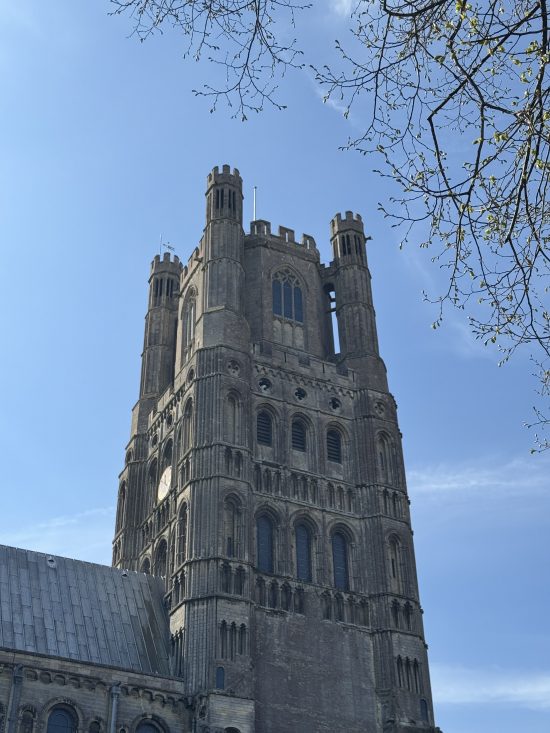
A symbol of Norman power in its day, and so a significant indicator of the power to oppress, it now scrapes by on the fees that tourists pay to view the genuine wonder of its architecture. That should not, however, confuse us as to its original purpose, which was less to provide a place of worship and rather more to symbolise the new Norman power in the land. A nearby castle once reinforced that, but it has long gone.
This image, also taken this morning, looks across Cathedral Green.
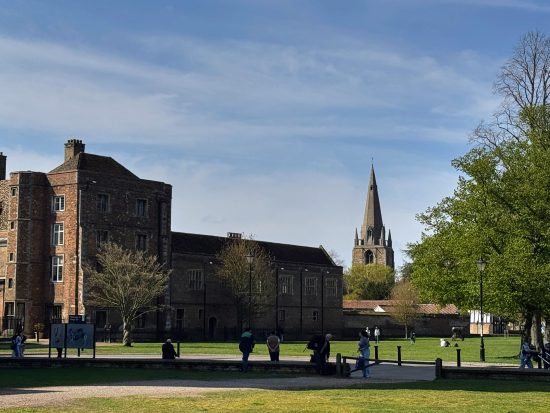
The building on the left was once the Bishops' Palace, and the Bishop of Ely was a mighty influential person in their day. Their See once covered much of East Anglia, and extended well into what we now consider to be the Midlands. The building is now part of the private King's school, which is still closely associated with the cathedral, and is in its own way another symbol of power and division within our society as a result.
Ordinary people survived all this. The houses of those with greater means still survive. This one is located on one side of the parish Church of Saint Mary's, which is on the far side of Cathedral Green.
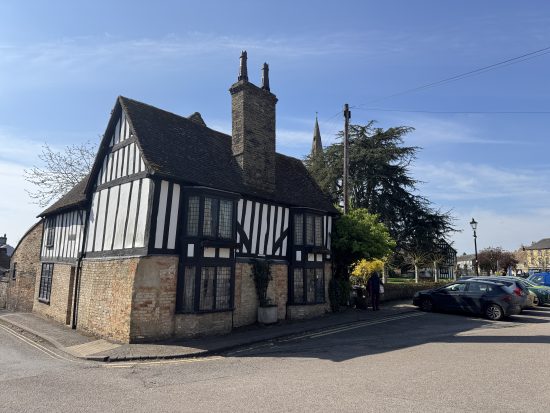
On the other side of the parish church is another house, this time with a notable past resident. Oliver Cromwell and his family lived here when he was MP for Huntingdon.
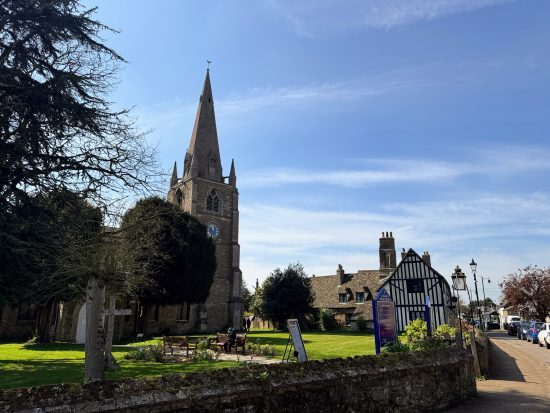
The facade in view was put in place around 125 years or so ago. The building itself would almost certainly have been familiar to Cromwell.
His house is not, however, the only symbol of power on the walk from the city centre to my home. This tithe barn (or was it a chapel, or even a hospital building - no one seems quite sure) dates from around the 14th century or slightly earlier, and was linked to the hospital of St Mary Magdelene and Saint John, the two surviving buildings from which date from the same period and are now subject to restoration by Historic England.
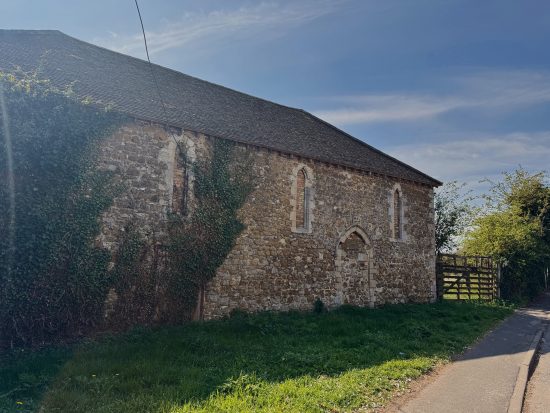
It would be great if they were opened to the public thereafter, because this hospital offers a different view of society at that time, when such institutions did provide care. There were around a dozen beds in this hospital.
History is littered with reminders of the use and abuse of power. Our job is to adapt to survive the consequences of both as best we are able.
Thanks for reading this post.
You can share this post on social media of your choice by clicking these icons:
There are links to this blog's glossary in the above post that explain technical terms used in it. Follow them for more explanations.
You can subscribe to this blog's daily email here.
And if you would like to support this blog you can, here:


 Buy me a coffee!
Buy me a coffee!

the people -or most of them-also survived the Black Death, Civil War, Agricultural and Industrial revolutions, world wars etc.
I am sure many of them wished for a better future. We can too.
Agreed
But that was my point – we ahve to focus on survival
Excellent final two sentences.
(Pics were good as well – nice place Ely).
Thanks Mike.
I took the pictures and dictated the blog as I walked home.
Pertinent thoughts Richard.
Presumably medieval serfs knew very directly – maybe personally- those who had power over their lives, the Lord of the Manor, the Bishops and priests , and that power was embodied in iconic buildings like your cathedral. There were revolts – largely unsuccessful.
How are we now – compared to then?
Many people today may be aware they lack power over their own lives, but maybe its not so clear whose doing the oppressing – despite the deluge of information. And certainly we are all at sea as to how we can effect real change – the system is rigged so that voting seems useless.
No sign of a peasants revolt.
Thanks
And much to agree with
Thank you for such an original entry to the blog.
I always worry about the people that not only have/will suffer, but won’t survive because of the evil caused.
In their memory and for the future’s sake we have to look up, be brave and be ready to give up our comfortable existence.
Thank you, and reminds me how hard our ancestors had to fight, we stand on their shoulders; East Anglia has a long tradition of oppressed people resisting abuse of power.
I often wonder what life would have been like if the Dane Law had remained, perhaps we would be as happy as the Danes living in non market housing, instead of wage slaving, with leasehold flats selling for £400,000 or renting a room for £700 pcm.
Indeed
Long live the memory of Robert Kett
Yes absolutely. Adapt and survive, while at the same time remaining honest, honourable and noble. We were born and we will die but while we have this breath, no matter what may be thrown our way, we can still chose kindness over indifference, generosity over greed and consciousness over conditioning.
How can we find more long-term thoughtfulness and generosity?
You wrote, Richard, “Our job is to adapt to survive the consequences of ‘the abuse of power.’”
Apparently Trump ‘is now determined to convince the world that climate change is a good thing.’ Last week Pete Hegseth spoke of his ‘loathing of European free-loading’. Do we, do Americans ‘free-load’?
In yesterday’s Guardian, Sir David King wrote: We passed the 1.5C climate threshold. We must now explore extreme options. … Without drastic and immediate climate action, this breach will not be temporary. The consequences – rising sea levels, extreme weather and devastating loss of biodiversity – are no longer projections for the distant future. They are happening now, affecting millions of lives …
I surmise that most of us who read this blog broadly agree with King’s analysis but … we don’t want to stop flying … unless our government makes us. CO2 is destroying the chances of our children but journeys to work, on holiday or even super-market shopping without a car? It is hardly thinkable. If everyone was made to, maybe … but that would mean massive government action of which there is no sign. And we know that it is much worse; the six women in Westminster Quaker Meeting House wanted to talk about climate as well as Gaza.
And our government wants ‘growth’ with no mention of excluding growth of CO2 emissions.
From around 1960, Ivan Illich wrote books such as ‘Deschooling Society’, and ‘Tools for Conviviality’ as well as deeply perceptive essays. He lived in Latin America when the Trans Amazonian Highway was being planned. He observed that for the money being allocated, every village in the Amazon basin could be connected to its neighbours by a two-metre wide track. Every village could be provided with a donkey vehicle capable of travelling at around 20 mph. Their engines could power often-needed pumps. They could have a trailer to carry goods – and another with benches or seats to carry people. The Amazon could now be exemplary and thriving. It isn’t.
Thanks
“Our job is to adapt to survive the consequences of ‘the abuse of power.’”
Sometimes pictures (or indeed video) tell you all you need to know about the abuse of power. Mies van der Rohe’s “German Pavillion” in Barcelona has a lot to answer for as this quasi-rip-off shows:
https://www.youtube.com/watch?v=lKaTHc-0fR4&t=111s
(best watched with the sound off).
Hubris & vanity writ large – this is what happens when you have far far more money than sense.
That is not a home